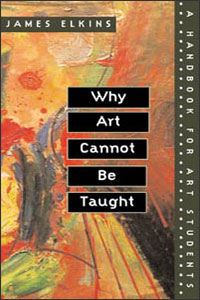If you haven't seen it yet, the most recent SNAAP report offers insights into statistical information about arts majors after graduation. It took me a moment to orient myself and then I found it a well-organized and valuable set of interactive infographics. From the Strategic National Arts Alumni Project.
You're probably familiar with Sir Ken Robinson, who suggests that it's time for a Revolution in the way we think about education, putting focus on student responsibility and choice in education. Many of his talks are available at TED.com... links here. I particularly like the one animated by RSAnimate, below.
Another TED.com speaker I've found valuable, Sugata Mitra, mostly studies younger students than ours. I have found the insights he offers on the effectiveness of student driven education valuable and sometimes frustrating to work with in my own field of Art History. He has spoken several times at TED, his bio here, and below the talk that captivated me most.
Allison Gagnon mentioned a series on Canadian Television regarding the future of education. The programs are available here, and offer varied and, from what I've sampled, highly valuable resources.
Under Book recommendations, I included Dan Siegl's Brainstorm: the Power and Purpose of the Teenage Brain. Siegl also gave a comprehensive TED talk, below. (I haven't listened yet, but it seems highly relevant!)
Daily Habits of Artists: their studios, their routines, their favorite meals. Here are a few that have caught my interest quite recently.
1. From one of my favorite online journals, Fast Company, started by former staffers at Harvard Business Review, a series of infographics about the daily routines of artists, here.
2. A very light article from the Huffington Post, which looks at behaviors of Highly Creative People, here.
3. I'm always talking about taking a walk, because that's how I solve problems. Apparently there's some science emerging that suggests exercise boosts creativity. An article from the Times, last month.
4. Value of Rest/Taking a break to learning/performance:
"Pre-Performance Apathy (or the Importance of Mentally Disengaging From Work and Practice)"
by Dr. Noa Kageyama
Cross Pollination:
From the Chronicle of Higher Ed:
Visual Art program at the University of the Arts has transformed the way they think about foundations classes and crossing disciplines.
From American Radioworks, a piece on rethinking traditional college teaching methods..... and how students can learn online, text and video
Teaching Creativity
On teaching creativity and raising 'art smart' kids (the latter directed toward younger kids, but still seem relevant!)
1. "Learning to Think Outside the Box: creativity becomes and academic discipline" from The New York Times.
2. "Raising "Art Smart' Students in the 21st Century" from The Kennedy Center's Arts Edge, builds from the research of the Partnership for 21st century skills which labels the arts as a core area of study for preparing students for the 21st century.
3. The Partnership for 21st Century Skills also prepared a skills map which explores the relationship between the Arts and other skills and outcomes of their pursuit at different k-12 levels. I found it hard to read through this article but enjoyed poking around it for ideas.
On the importance of Reflection in Learning:
1. A very brief article summing up the major points from John Dewey, Jürgen Habermas, and others: "Why Reflect?"
2. A much more substantive (long) article about reflection, Professional Development, and Online Learning, here.
Another brief article on reflection and learning here:
 |
| Image by NanaGimenes |
1. From one of my favorite online journals, Fast Company, started by former staffers at Harvard Business Review, a series of infographics about the daily routines of artists, here.
2. A very light article from the Huffington Post, which looks at behaviors of Highly Creative People, here.
3. I'm always talking about taking a walk, because that's how I solve problems. Apparently there's some science emerging that suggests exercise boosts creativity. An article from the Times, last month.
4. Value of Rest/Taking a break to learning/performance:
"Pre-Performance Apathy (or the Importance of Mentally Disengaging From Work and Practice)"
by Dr. Noa Kageyama
Cross Pollination:
From the Chronicle of Higher Ed:
Visual Art program at the University of the Arts has transformed the way they think about foundations classes and crossing disciplines.
From American Radioworks, a piece on rethinking traditional college teaching methods..... and how students can learn online, text and video
Teaching Creativity
On teaching creativity and raising 'art smart' kids (the latter directed toward younger kids, but still seem relevant!)
1. "Learning to Think Outside the Box: creativity becomes and academic discipline" from The New York Times.
2. "Raising "Art Smart' Students in the 21st Century" from The Kennedy Center's Arts Edge, builds from the research of the Partnership for 21st century skills which labels the arts as a core area of study for preparing students for the 21st century.
3. The Partnership for 21st Century Skills also prepared a skills map which explores the relationship between the Arts and other skills and outcomes of their pursuit at different k-12 levels. I found it hard to read through this article but enjoyed poking around it for ideas.
On the importance of Reflection in Learning:
1. A very brief article summing up the major points from John Dewey, Jürgen Habermas, and others: "Why Reflect?"
2. A much more substantive (long) article about reflection, Professional Development, and Online Learning, here.
Another brief article on reflection and learning here:




